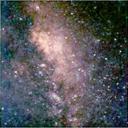Yahoo Answers is shutting down on May 4th, 2021 (Eastern Time) and beginning April 20th, 2021 (Eastern Time) the Yahoo Answers website will be in read-only mode. There will be no changes to other Yahoo properties or services, or your Yahoo account. You can find more information about the Yahoo Answers shutdown and how to download your data on this help page.
Trending News
Was gravitational control ever factored by the IAU in determining the planet Pluto's status?
Mercury is now billed as the smallest planet in the solar system.
The planet Pluto used to hold that distinction as we all know and has been kicked outta the solar system by the IAU.
The planet Mercury who has a mass of 3.3022x10 kg to the 23rd power, has NO moon.
The planet Pluto has a mass of 1.305x10 kg to the 7th power power has FOUR moons under it's gravitational control.
Charon weighs in at 1.52x10 kg to the21st power.
Hydra: 4.2x10 kg to the 17th power.
Nix: 2x10 kg to the 15th power
The newly discovered moon of the planet Pluto, P-4, hasn't been adequately measured and sized yet but their is one school of thought that puts P-4 at twice the size of the planet Pluto.
That's a bit of a stretch for me. I prefer to place P-4 in the neighborhood of Nix until more is determined.
But considering the amount of mass under the planet Pluto's gravitatational control exceeds that of Mercury Pluto should should reinstated as a full fledged planet of our solar system.
7 Answers
- Anonymous9 years agoFavorite Answer
Yes, Pluto's mass and acceleration of gravity were a factor. That's what the "cleared the neighborhood" criterion is based on. This is what the IAU is going to have to explain and justify for the larger scientific community at this years national and international IAU conferences this year. Pluto HAS cleared its "neighborhood" well enough that nothing massive enough has slammed into Pluto for 82 years to significantly change the trajectory of Pluto's orbit. All the massive objects in Pluto's "neighborhood" have either been kicked out of Pluto's and its satellites' neighborhood, into the Kuiper belt, or out of the Solar system entirely. Geophysically and dynamically, Pluto IS a planet because it has enough mass to HAVE cleared its neighborhood pretty well.
The president of the IAU had PERSONAL political (not necessarily federal politics) and professional credibility at stake in 2006. I'm expecting a lot of verbal fireworks at this years IAU conferences. What goes into the proceedings of scientific conferences is a very small part of what is accomplished by scientists and graduate and undergraduate students social networking with each other at scientific conferences. No matter how Pluto is CLASSIFIED, it is a planet.
"...98% of EVERYTHING around here is POLITICS!!!!..." may be trite, but it's VERY TRUE IRL.
- 9 years ago
Well "gravitational control" doesn't really mean anything, since gravity is entirely dependent on the mass of an object. The higher the mass, the more powerful the gravitational force that object can exert on another. In context of the solar system, the reason that Mercury has no moons is because there is little to no "loose" material orbiting the sun at that distance while Pluto actually orbits within the inner limits of an enormous belt of trillions of objects. It has moons for the same reason Saturn has rings, it orbits in a ring of loose, capturable objects. Many of these objects were shown to be even more massive than Pluto, and there are enormous asteroids out there like Ceres that seem to have orbital effects on smaller objects also. I think the IAU agreed to disqualify Pluto as a planet because it wasn't unique in the sense that a large percentage of small, nonplanet objects in the solar system had the same mass that it did, and if they stuck to their traditional definition of a planet, all of these objects would also be considered planets. It seemed more practical to dethrone Pluto.
- az_lenderLv 79 years ago
Pluto simply has more in common with Eris and the Kuiper Belt objects.
Read Mike Brown's "How I Killed Pluto and Why It Had It Coming"
The amount of mass "under the planet Pluto's gravitational control" does NOT
exceed the mass of Mercury. Your arithmetic is faulty.
- Jason TLv 79 years ago
Pluto only has that mass under its 'control' due to its gravity, and Mercury has more of that than Pluto does. Mercury just doesn't happen to have any significantly sized lumps of rock floating around near it to be captured.
- How do you think about the answers? You can sign in to vote the answer.
- 9 years ago
Unmanned spacecraft have passed close enough to several small asteroids and have found that a large percentage of them have their own moons. They are only a few miles across and their "moons" smaller still. They have their own gravitational influence ("domain" as you put it), but clearly they don't qualify as planets by any reasonable criteria.
- SpartanCanuckLv 79 years ago
Mercury has cleared and ordered its orbit. Pluto's number of moons is a symptom of how cluttered its orbit is.





